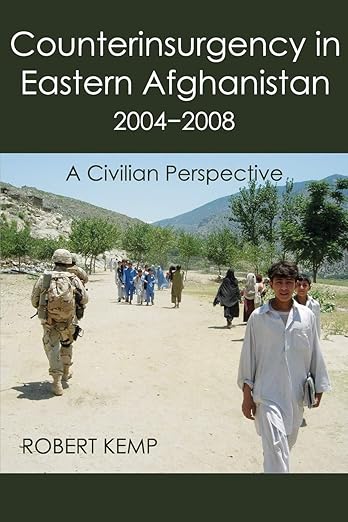
Counterinsurgency in Eastern Afghanistan 2004-2008
Series: Memoirs and Occasional Papers Author: Kemp, Robert Category: Memoirs and Occasional Papers, United states, history Publisher: New Academia Publishing, LLC (2014) ISBN: 978-0990447146 Pages: 246 Share: More DetailsAfter the 2001 ouster of the Taliban from Afghanistan, the United States and its allies found themselves in a country devastated by a series of wars. This book looks at how, working with their Afghan counterparts, they engaged in a complex effort to rebuild security, development, and governance, all while fighting a low-intensity war.
Drawing on his experience on the ground, Robert Kemp gives us a firsthand, unfiltered view of how U.S. military and civilian officers coped with a confusing, constantly changing situation along the border with Pakistan. It looks at how they developed programs and methods, such as Provincial Reconstruction Teams, while learning to work with the Afghans––and each other. Kemp looks at the nature of the insurgency–– how it gained momentum beginning in 2005, turning into a multifaceted, grinding, murky conflict against multiple groups: the Taliban, the Haqqani network, and Al Qaeda. It describes the nature of the border with Pakistan, the complex tribal and ethnic relations, rapid changes in Afghan society, poppy and opium production, corruption, and how the army and police developed. Each chapter analyzes the policies and practices involved, and offers lessons learned.
Eastern Afghanistan is one of the most colorful, traditional, and unique areas left in the world. This book looks at what happened in 2004–2008, as the United States became heavily engaged there.
Other Books From - Memoirs and Occasional Papers
Editorial Reviews
“Robert Kemp’s candid account of the joint efforts of American military officers and civilians to help local government officials and ordinary citizens in remote, often dangerous areas to reconstruct their war-torn country is a valuable contribution to our understanding of American achievements and failures in Afghanistan. It also usefully illustrates how 21st century challenges have greatly widened the range of activities our diplomats must pursue. ”
––Howard B. Schaffer, U.S. Ambassador (ret.)
“Robert Kemp’s Counterinsurgency in Eastern Afghanistan 2004–2008: A Civilian Perspective is a must-read for all those following developments in Afghanistan since 2001. The book succeeds both as thoughtful analysis and as a practical guide for military and civilian personnel in the field. Perhaps its greatest value is that the approach taken is relevant not only for Afghanistan but also for other regions of the world where similar conditions exist.”
–– Arturo Muñoz, RAND Corporation
Robert Kemp, a U.S. State Department Foreign Service officer, served in Afghanistan from 2004 to 2005, from 2007 to 2008, and for two shorter assignments. He was the Deputy Director of the Pakistan Desk in Washington and also completed several short-term assignments in Pakistan. Other posts have included China, the Philippines, USNATO/Brussels, Bolivia, and Brazil. Kemp holds Master’s degrees from the University of Kentucky and the Johns Hopkins School of Advanced International Studies, and was a Dean Rusk Fellow at Georgetown University. He was awarded the Department of the Army Commander’s Award for Public Service for his work in Afghanistan.
About the author
Kemp, Robert
After the 2001 ouster of the Taliban from Afghanistan, the United States and its allies found themselves in a country devastated by a series of wars. This book looks at how, working with their Afghan counterparts, they engaged in a...
Read More
 Peregrina
Peregrina  Arabian Nights and Daze
Arabian Nights and Daze  A Haiti Chronicle: The Undoing of a Latent Democracy, 1999-2001
A Haiti Chronicle: The Undoing of a Latent Democracy, 1999-2001  A Long Way from Runnemede
A Long Way from Runnemede  Arias, Cabalettas, and Foreign Affairs
Arias, Cabalettas, and Foreign Affairs  From the Inside Out
From the Inside Out  Bushels and Bales
Bushels and Bales  Memoirs of an Agent for Change in International Development
Memoirs of an Agent for Change in International Development  French Covert Action in the American Revolution
French Covert Action in the American Revolution  Peck’s Postulates
Peck’s Postulates